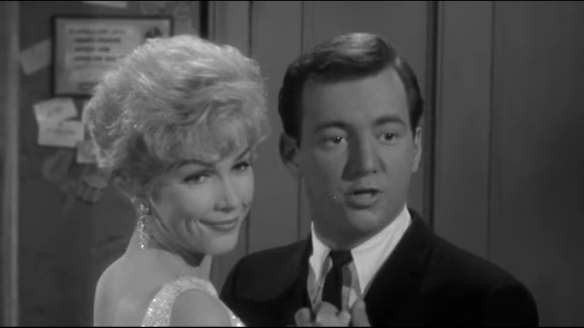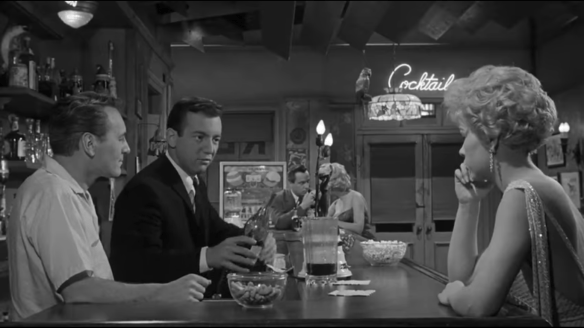It’s hard not to instantly think of Too Late Blues as a historical curio. Here’s a studio film from John Cassavetes that seems fully aware of the context of Shadows. Shadows, of course, was his independently-made directorial debut that took improvisation and a jazz-like mentality to the streets of New York and the beat generation.
The images here are sleek, but they feature much of the same world carried over from the previous film with a young black audience watching as a group of white musicians play their set. We come to know the boys through their daily rituals: they hang out, shoot pool, drink beer, and play music in parks and beer hauls for pennies. It’s not much of a life, but they seem generally content with what they’re doing.
Cassavetes originally wanted Montgomery Clift and his wife Gena Rowlands in the leads. I would definitely have paid to see that film, but there’s still more than enough that’s intriguing about what he ended up with. Bobby Darin doesn’t sing a lick and it’s a daring career decision because it rests on the bearing of performance.
His Ghost Wakefield is at his best as one of the boys because they function together as a mirthful and inspiring unit. As was thinking when they show up at a local gather how I dig a John Cassavetes party. It’s lively and a packed room, but there’s a cool, relaxed ambiance to it as the boys get greeted by their host and Bobby Darin makes his way up the spiral staircase to mingle.
Cassavetes feels like he’s giving us so many great perches to watch and observe the social experiment going on around us. There are optimal spaces from which to focus on the actors, whether through close-ups or a camera that constantly seems to be following them from the hilt with grave interest.
It’s a bit cleaner, it has the bangles, the bells, and the whistles that give off Hollywood, and yet there are still elements of his directorial debut and future works that bleed into this picture. If you’ll pardon the term, it’s “tainted,” but it still fits fluidly into Cassavetes’s body of work even as it functions at its best as a group effort. It wouldn’t work without the many voices and faces who are more than ready to oblige.
Rupert Crosse as Baby is one such figure as is Seymor Cassel, beginning his own auspicious collaboration with the writer-director. If you’re like me, you also get a private satisfaction in seeing Ivan Dixon even for the briefest of moments.
However, we have yet to mention our heroine: Stella Stevens. We meet her stationed by a piano accompanied by a lively crowd. She’s a flustered young singer and as parties such as these are not for the faint of heart, it’s an excruciating moment to watch her try to perform.
In the aftermath, her eyes flutter like a beautiful deer caught in the headlights. Ghost watches her and compliments her. It seems genuinely sincere. Instead of sticking around, they set up in a booth at a local bar. If it doesn’t sound like Too Late Blues is about anything consequential, at least in theatrical terms, then we’ve come to an understanding of why the movie was never a box office smash.
The sinews of the story are all an examination of characters as only Cassavetes might be fascinated in documenting, and the narrative gladly moseys along at its own predetermined pace. The wheeling-dealing agent Benny with his crewcut wears a crooked smile, though he generally means well. He does his best to scrounge up work for Ghost and the boys as well as Jess with varying degrees of success. The bottom line is that Benny tries and he really is tender at heart.
With all this groundwork, what’s really appealing about Too Late Blues are individual scenes or ideas that have been assembled together to create something else. Take, for instance, the interludes where Jess goes from self-loathing to loving Ghost, even lusting after him. They head to her apartment and on the way take a detour onto the diving board.
She lets him in. Coaxes him to keep the lights low and to wait on the bed. She’s prepared to make his evening as it were, but that’s not what he’s looking for. He wants her common, everyday unadulterated love. It flips the script even slightly as she becomes the aggressor.
However, if Ghost’s masculinity is ever in jeopardy, it’s during a bar room brawl. Vince Edwards gets the most prominent cameo as a rowdy pool player who stirs up trouble after a line of drinks. He gives everyone the business, but as he’s got the pianist in a helpless headlock, his girl looking on, it’s like his dignity has been snapped like matchwood. If she is a fragile human being, his ego is more fragile still, and he lashes out. They are actions he cannot take back.
The one false step might be the arc of Ghost. He’s not altogether the most interesting part of this picture. It’s an endeavor functioning in the crowd and the ensemble — him paired with Princess or the barman or his agent together — living out their lives in these standalone moments strung together. The luster is gone when we start seeing a version of A Star is Born or Limelight. We hardly need another. Time flashes forward and we see he’s just another phony. There is no revelation here.
Thrown back together with Jess, they have a renewed moment of rage. For once the camera shakes, and it feels telling. We are aware of the movie again, and in one glorious bathroom drain shot, there is a cinematic directness of Hitchcockian proportions. The camera cuts to the core of the moment, this final act of drama and duress. Graciously we are allowed an exhale afterward.
It occurs to me this movie is a lovely bit of metanarrative. During their recording session, when Ghost charges into the sound booth vowing to play the music his way, it’s like a switch has been flipped. He intimates that he thought the financier wouldn’t tell him how to play his music — that the Man would just listen. He’s rebuffed. This is not the way the world works; it’s not what people want. Commercialism is what makes the world go round.
Whether there’s more than an ounce of truth in the analogy, it’s easy enough to cast Cassavetes as the jazzman fighting against the constraints around him to make his art as he sees fit. Like Ghost, he’s trying to navigate an industry trading in commerce and art.
To his credit, it seems Cassavetes never became totally beholden to one or the other straddling the line between both quite spectacularly and even holding together some semblance of a personal life. By that I mean he had a wife and family and of course, it helped that his wife Gena Rowlands was an actress, and they remained on the same wavelength for most of his career. In the end, he didn’t fulfill the destiny of Ghost. He found a way to live his own life.
3.5/5 Stars



Pingback: Nothing But a Man (1964) and Human Dignity | 4 Star Films